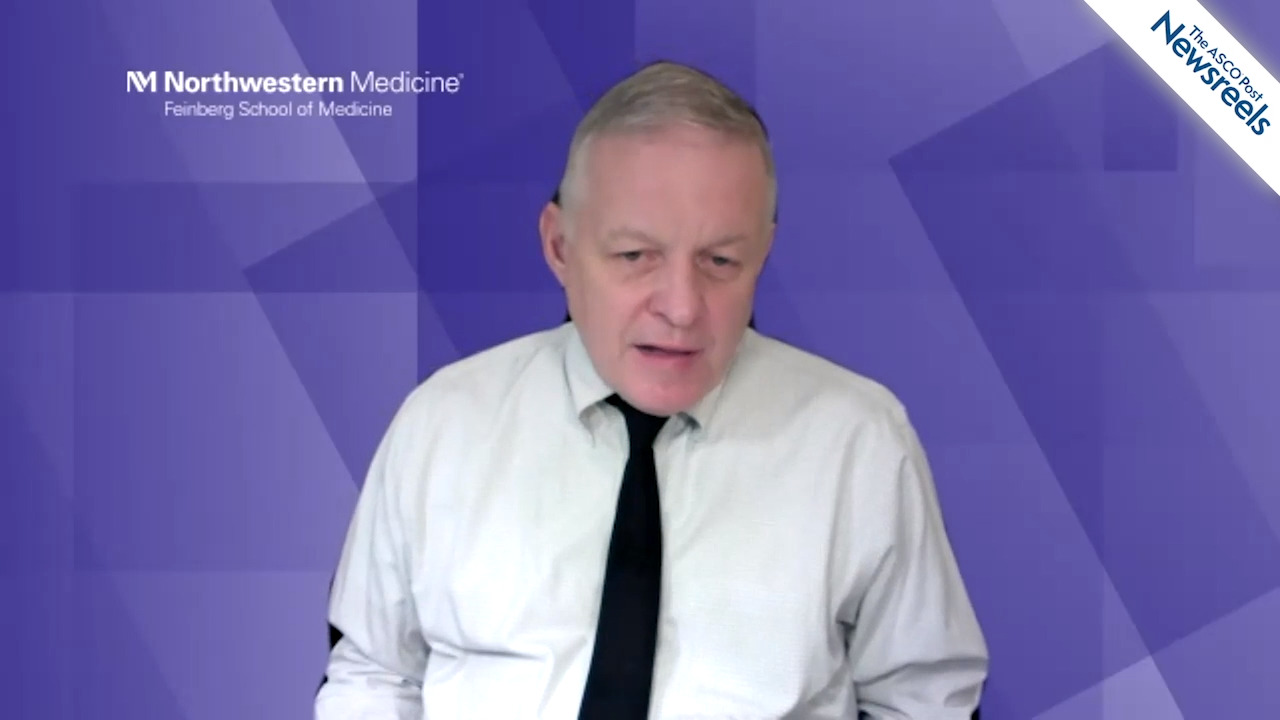Overweight Breast Cancer Survivors May Be at Increased Risk of Developing a Secondary Malignancy
Breast cancer survivors who are overweight have a statistically significant increased risk of developing second primary cancers, according to results from a study conducted by Feigelson et al and published in the Journal of the National Cancer Institute. “These findings have important public health ...
Addition of Alpelisib to Fulvestrant for PIK3CA-Mutant, HR-Positive, HER2-Negative Advanced Breast Cancer: Patient-Reported Outcomes
In an analysis from the PIK3CA-mutant cohort of the phase III SOLAR-1 trial reported in the Journal of Clinical Oncology, Eva Ciruelos, MD, PhD, and colleagues found that the addition of alpelisib to fulvestrant was not associated with significant worsening of global health status/quality of life...
Melinda L. Telli, MD, on HER2-Positive Breast Cancer: NCCN Guidelines Update
Melinda L. Telli, MD, of Stanford Cancer Institute, discusses highlights of the new NCCN Clinical Practice Guidelines in Oncology®, including nonanthracycline, taxane-based regimens as preferred treatments for patients with HER2-positive breast cancer; newly approved combination therapies such as tucatinib plus capecitabine plus trastuzumab, margetuximab plus chemotherapy, and neratinib plus capecitabine; and recommendations for third line and beyond.
Linda T. Vahdat, MD, MBA, on Triple-Negative Breast Cancer: Targeting the Tumor Microenvironment
Linda T. Vahdat, MD, MBA, of Memorial Sloan Kettering Cancer Center, discusses results of a phase II trial designed to test the concept that targeting the tumor microenvironment by depleting copper may prevent metastases, essentially disrupting the infrastructure that contributes to tumor spread.
Dennis J. Slamon, MD, PhD, on Exploiting Cancer Biology in Developing New Treatment Paradigms
Dennis J. Slamon, MD, PhD, of the UCLA David Geffen School of Medicine, reflects on the ways in which breast cancer research pioneered the targeted treatment approach, as understanding of the basic biology of tumors deepened and new pathways were uncovered. He sees a future ripe with possibilities for new molecular targets to further improve outcomes for patients with breast cancer and other types of tumors.
Estimated Shifts in Cancer Incidence and Death Over Next 2 Decades
In the next 2 decades, rankings of incidence and death across cancer types in the United States will undergo important changes, according to new research published by Lola Rahib, PhD, and colleagues in JAMA Network Open. The study estimates that pancreatic cancer is on course to become the...
Liquid Biopsy Plus MRI for Predicting Response to Neoadjuvant Chemotherapy in Patients With Breast Cancer
Cirmena et al discussed whether using a liquid biopsy test to assess plasma cell-free DNA (cfDNA) integrity could improve the accuracy of magnetic resonance imaging (MRI) for predicting the achievement of complete response among patients with locally advanced breast cancer who had received...
Rita Nanda, MD, on Triple-Negative Breast Cancer: Emerging Therapeutic Strategies
Rita Nanda, MD, of the University of Chicago, discusses the latest data on novel treatment strategies for triple-negative breast cancer, including immune checkpoint, PARP, and ATK inhibitors; antibody-drug conjugates; and targeting the androgen receptor.
An Oncologist and His Wife Share a Personal Cancer Story
Gastrointestinal oncologist John Marshall, MD, is well known for his candid observations about cancer treatment and research. In 2006, all the scientific intricacies and sociopolitical dramas of oncology coalesced in Dr. Marshall’s life when his 43-year-old wife, Liza, was diagnosed with breast...
Breast Cancer Screening With Clinical Breast Examination in Low- and Middle-Income Countries
Globally, breast cancer surpassed lung cancer as the most common cancer among women, with an estimated 2.3 million cases in 2020.1,2 Approximately 685,000 women will die of breast cancer in 2020 around the world. Approximately 24.5% of all cancers in women are breast cancer, and 15.5% of...
Clinical Breast Examination Screening Results in Lower Stage at Breast Cancer Diagnosis and Reduced Breast Cancer Mortality in India
In an Indian study reported in the British Medical Journal, Indraneel Mittra, MD, PhD, of Tata Memorial Centre, Homi Bhabha National Institute, Mumbai, and colleagues at Tata Memorial Centre found that breast cancer screening with clinical breast examination vs active surveillance resulted in...
Outcomes With Ribociclib Across Intrinsic Subtypes of HR-Positive, HER2-Negative Breast Cancer
In an analysis of several phase III MONALEESA trials reported in the Journal of Clinical Oncology, Aleix Prat, MD, PhD, and colleagues found consistent progression-free survival benefits with the combination of ribociclib plus endocrine therapy vs placebo plus endocrine therapy across all intrinsic ...
FDA Grants Regular Approval to Sacituzumab Govitecan-hziy for Pretreated Patients With Triple-Negative Breast Cancer
On April 7, 2021, the U.S. Food and Drug Administration (FDA) granted regular approval to sacituzumab govitecan-hziy (Trodelvy) for patients with unresectable locally advanced or metastatic triple-negative breast cancer who have received two or more prior systemic therapies, at least one of them...
Role of Antibody-Drug Conjugates Across Breast Cancer Subtypes
For the treatment of breast cancer, antibody-drug conjugates are emerging as effective players that could impact all subtypes of this disease, according to Kevin Kalinsky, MD, MS, Director of the Glenn Family Breast Cancer at the Winship Cancer Institute of Emory University, Atlanta. In the...
Germline BRCA1/2 and Other Predisposition Genes in Patients With Metastatic Breast Cancer: Prevalence and Association With Prognosis
In a German prospective registry study reported in the Journal of Clinical Oncology, Peter A. Fasching, MD, and colleagues identified the prevalence of germline mutations in BRCA1/2 and other breast cancer risk genes in patients with metastatic disease and found similar prognosis with presence vs...
Low-Dose Tamoxifen for Reduction of Mammographic Density in Women Undergoing Breast Cancer Screening
In the Swedish phase II KARISMA study reported in the Journal of Clinical Oncology, Eriksson et al found noninferior mammographic density reduction and reduced vasomotor symptoms following tamoxifen therapy at 2.5, 5, and 10 mg vs the standard dose of 20 mg among women undergoing breast cancer...
Impact of COVID-19 Pandemic on Delivery of Breast Cancer Care in New York
In a single-institution retrospective study focused on a New York City location reported in JCO Oncology Practice, Satish et al found that more than 40% of patients with breast cancer not infected with COVID-19 had a delay or change in care delivery due to the pandemic. Study Details The study...
Does Adding Adjuvant Concurrent Trastuzumab to Radiotherapy After Lumpectomy for HER2-Positive DCIS Reduce Ipsilateral Recurrence?
As reported in the Journal of Clinical Oncology by Cobleigh et al, the phase III NRG Oncology/NSABP B-43 trial did not show a significant reduction in ipsilateral breast tumor recurrence with the addition of adjuvant concurrent trastuzumab to radiotherapy in women undergoing lumpectomy for...
Does Consumption of Ultra-Processed Food and Drink Increase Colorectal Cancer Risk?
Consumption of ultra-processed food and drink could increase the risk of developing colorectal cancer. This was the conclusion of a large study published by Romaguera et al in Clinical Nutrition based on questionnaires about food behaviors completed by around 8,000 people in Spain. The study, the...
Younger vs Older Women With Breast Cancer: Understanding the Differences
Younger women with breast cancer differ from their older counterparts in ways that should be appreciated by their clinicians, according to Ann H. Partridge, MD, MPH, FASCO, Vice Chair of Medical Oncology at Dana-Farber Cancer Institute and Professor of Medicine at Harvard Medical School. At PER’s...
I Want to Live Long and I Want to Live Well
I’m a person who doesn’t like uncertainty. I’m also a worrier. So, when my hand kept going to the same spot on the upper part of my left breast near my chest wall, I couldn’t shake the feeling that something wasn’t quite right, which persisted even after a routine mammography failed to find any...
Breast Cancer Susceptibility Genes: Putting the Pieces Together
With the widespread use of multigene panels for germline genetic testing, understanding the cancer risks associated with pathogenic or likely pathogenic variants (ie, mutations) has become increasingly necessary. To identify which genes are breast cancer susceptibility genes, population studies...
U.S. Population–Based Study of Prevalence of and Risk Associated With Breast Cancer–Predisposition Genes
In a U.S. population–based, case-control study reported in The New England Journal of Medicine, Chunling Hu, MD, PhD, of the Mayo Clinic, Rochester, Minnesota, and colleagues identified the prevalence of and breast cancer risk associated with germline pathogenic variants in established and...
Female Breast Cancer Surpasses Lung Cancer as the Most Commonly Diagnosed Cancer Worldwide
Cancer ranks as a leading cause of death in every country in the world, and, for the first time, female breast cancer is the most commonly diagnosed cancer, overtaking lung cancer, according to a collaborative report from the American Cancer Society (ACS) and the International Agency for Research...
Development of Oral Taxane Tesetaxel to Be Discontinued
Following feedback from the U.S. Food and Drug Administration (FDA) in a pre–new drug application meeting, Odonate Therapeutics has concluded that the clinical data package for tesetaxel, an oral taxane tested in patients with metastatic breast cancer, is unlikely to support FDA approval....
Distant Metastasis–Free Survival With Adjuvant vs No Adjuvant Chemotherapy According to Genomic and Clinical Risk in Early Breast Cancer
In an updated analysis of the European phase III MINDACT trial reported in The Lancet Oncology, Martine Piccart, MD, and colleagues found confirmatory evidence of the initial finding of a high rate of distant metastasis–free survival among patients with high–clinical-risk but low–genomic-risk...
No Benefit Found for Everolimus Plus Adjuvant Hormone Therapy in High-Risk Early-Stage Breast Cancer
Everolimus plus hormone therapy improves outcomes in the advanced disease setting but apparently not in the adjuvant setting, according to the results of the UNIRAD trial, presented as a part of the European Society for Medical Oncology (ESMO) Virtual Plenary program.1 “In the UNIRAD study, after...
Time to Treatment Initiation for Breast Cancer During the COVID-19 Pandemic: Single-Institution Study
In a single-institution study reported in JCO Oncology Practice, Hawrot et al found that there was no increase in time to treatment initiation after histologic diagnosis in patients with newly diagnosed breast cancer during the first wave of the COVID-19 pandemic in 2020. However, they did find...
William J. Gradishar, MD, on Triple-Negative Breast Cancer: NCCN Guidelines Update
William J. Gradishar, MD, of Robert H. Lurie Comprehensive Cancer Center of Northwestern University, discusses the latest recommendations from the National Comprehensive Cancer Network for treating patients with triple-negative breast cancer; data on early-stage and advanced disease; and the role of checkpoint inhibitors, antibody-drug conjugates, and PARP inhibitors.
DCIS Biologic Risk Signature May Predict Risk of Recurrence and Radiation Benefit After Breast-Conserving Surgery
Women with ductal carcinoma in situ (DCIS) and elevated decision scores had a significantly higher risk of ipsilateral breast events and a greater relative benefit from radiation therapy compared to women with lower decision scores, according to research presented by Mann et al at the Society of...
Improving the Prognostic Accuracy of Residual Cancer Burden After Neoadjuvant Chemotherapy for Breast Cancer
An analysis of 546 patients with breast cancer who received neoadjuvant chemotherapy demonstrated that residual cancer burden is prognostic for overall survival, recurrence-free survival, and distant relapse–free survival, according to research presented by White et al at the Society of Surgical...
Pembrolizumab vs Chemotherapy in Previously Treated Patients With Metastatic Triple-Negative Breast Cancer: KEYNOTE-119
As reported in The Lancet Oncology by Eric P. Winer, MD, FASCO, and colleagues, the phase III KEYNOTE-119 trial showed no significant improvement in overall survival with pembrolizumab vs investigator’s choice of chemotherapy in the second- or third-line treatment of metastatic triple-negative...
Persistent Use of Low-Value Breast Cancer Surgeries Designated for Deimplementation by Choosing Wisely
In a retrospective cohort study reported in JAMA Surgery, Wang et al found persistent use of low-value breast cancer surgeries designated for deimplementation by the Choosing Wisely program, with a wide interfacility variation in use of these procedures. Study Details The study used National Cancer ...
Novel HER2-Targeted Therapies Pose Sequencing Challenges
With three new HER2-targeted therapies approved in the past 15 months alone, the treatment landscape for patients with metastatic breast cancer has become increasingly crowded. In the third-line setting and beyond, there are now at least eight HER2-targeted agents approved by the U.S. Food and Drug ...
Study Finds Regularly Drinking Sugar-Sweetened Soda May Increase Total and Breast Cancer Mortality
New research published by Koyratty et al in Cancer Epidemiology, Biomarkers & Prevention suggests that patients with breast cancer who drink sugar-sweetened beverages regularly are at increased risk for death from any cause, and from breast cancer in particular. Compared to women who never or...
FDA Oncologic Drugs Advisory Committee to Review Status of Six Indications Granted Accelerated Approval
Recently, the U.S. Food and Drug Administration (FDA) announced that the agency will hold a public meeting of the Oncologic Drugs Advisory Committee on April 27 to 29 to discuss six indications granted accelerated approval that have since reported results from confirmatory trials that have not...
Older Breast Cancer Survivors May Consider Discontinuing Screening Mammography in the Setting of Limited Life Expectancy
Newly issued mammography screening guidelines for breast cancer survivors aged 75 and older recommend discontinuing routine mammography for those with a life expectancy of less than 5 years and considering discontinuation of routine screening for those with a life expectancy between 5 and 10 years. ...
Miami Breast Cancer Conference: Genomic Assays Show Utility in Predicting Pathologic Complete Response Rate in Pre- and Postmenopausal Patients With Breast Cancer
New data from the prospective Neoadjuvant Breast Symphony Trial (NBRST), which demonstrated the predictive and prognostic abilities of the MammaPrint and BluePrint assays and underpinned their preoperative utility in pre-and postmenopausal patients with breast cancer, were presented at PER’s Miami...
Miami Breast Cancer Conference: Updated DESTINY-Breast01 Results Show Trastuzumab Deruxtecan-nxki Delivers Durable Responses
In updated results from the pivotal DESTINY-Breast01 trial, trastuzumab deruxtecan-nxki (T-DXd) demonstrated high rates of durable responses consistent with prior results, with encouraging progression-free survival and overall survival in patients with HER2-positive metastatic breast cancer. These...
New Global Breast Cancer Initiative Highlights Renewed Commitment to Improve Survival
A major new collaborative effort, the Global Breast Cancer Initiative, was introduced by the World Health Organization (WHO), with the objective of reducing global breast cancer mortality by 2.5% per year until 2040, thereby averting an estimated 2.5 million deaths. In recognition of International ...
Outcomes With Internal Mammary and Medial Supraclavicular Nodal Irradiation in Stage I to III Breast Cancer
As reported in The Lancet Oncology by Philip M. Poortmans, PhD, Department of Radiation Oncology of the Iridium Netwerk and the Faculty of Medicine and Health Sciences, University of Antwerp, and colleagues, 15-year outcomes of the phase III EORTC 22922/10925 trial show continued reduction in...
Salpingo-Oophorectomy to Reduce Ovarian Cancer Risk in Women With BRCA1 or BRCA2 Pathogenic Variants May Also Reduce Breast Cancer Risk
In a study reported in JAMA Oncology, Choi et al found that risk-reducing salpingo-oophorectomy in women with BRCA1 or BRCA2 pathogenic variants was associated with a reduced risk of breast cancer within 5 years after surgery, with evidence of longer-term risk reduction among those with BRCA1...
Increase in Diagnosis of Node-Positive and Stage III Breast Cancer After Screening Interruption Due to the COVID-19 Pandemic
A new report from Italy published by Toss et al in ESMO Open noted an increase in diagnoses of node-positive and stage III breast cancer after a 2-month interruption in breast cancer screening due to the COVID-19 pandemic. These findings support recommendations for a quick restoration of breast...
Adherence to Adjuvant Hormonal Therapy Among Commercially Insured Women With Breast Cancer
In a study reported in JCO Oncology Practice, Zhao et al found that 5-year adherence to adjuvant hormonal therapy was low among commercially insured women with breast cancer in the United States. The retrospective observational study used data from the IBM MarketScan Research Databases to identify...
Miami Breast Cancer Conference: Study Examines Response to Neoadjuvant Chemotherapy in Hispanic and Black Patients
Few studies documenting the benefit of neoadjuvant chemotherapy for breast cancer have been conducted in minority populations. A single-institution study reported at PER's Miami Breast Cancer Conference, held virtually this year, confirmed that neoadjuvant chemotherapy improved axillary disease in...
Effect of Clinical Breast Examination Screening on Stage at Diagnosis and Breast Cancer Mortality
In an Indian study reported in the British Medical Journal, Mittra et al found that breast cancer screening with clinical breast examination vs active surveillance resulted in younger age and significant downstaging of disease at diagnosis of breast cancer, a significant reduction in breast cancer...
Study Finds Missing Annual Mammogram Increases Risk of Death From Breast Cancer
Regular mammography screening substantially reduces the risk of dying from breast cancer, according to a large study of over half a million women published by Stephen W. Duffy, MSc, and colleagues in the journal Radiology. Researchers said women who skipped even one scheduled mammography screening...
Updates From Selected Clinical Trials in Breast Cancer
Each year, following the San Antonio Breast Cancer Symposium (SABCS), The ASCO Post asks Jame Abraham, MD, FACP, to offer his picks of the most important and most clinically relevant research presented at this meeting. The following are summaries of studies that caught Dr. Abraham’s attention from ...
PHOEBE Trial: Pyrotinib/Capecitabine vs Lapatinib/Capecitabine in HER2-Positive Metastatic Breast Cancer Previously Treated With Trastuzumab
In a prespecified interim analysis of the Chinese phase III PHOEBE trial reported in The Lancet Oncology, Xu et al found that the combination of the irreversible pan-HER inhibitor pyrotinib plus capecitabine significantly prolonged progression-free survival vs lapatinib plus capecitabine in...
I Let Science, Not Emotion, Dictate My Treatment
I had my first experience with cancer when I was just 3 or 4 years old and complained to my mother that my “tummy hurt.” I was diagnosed with Wilms tumor, the same cancer my 18-month-old brother died of before I was born. I remember being in the hospital for weeks at a time and being known by...





